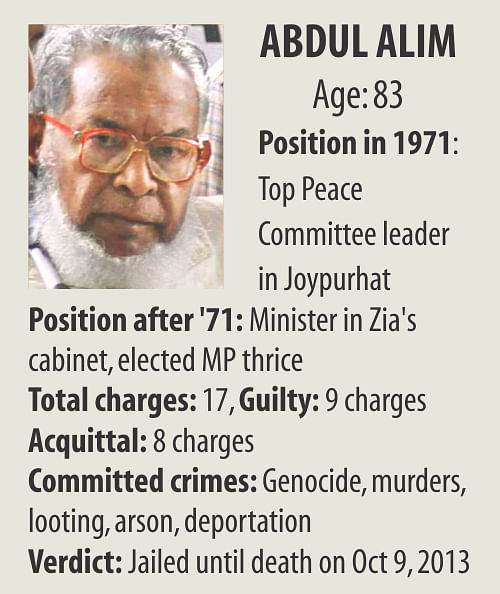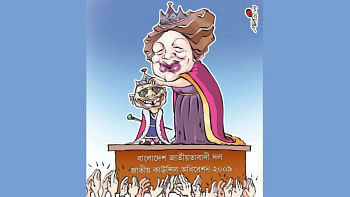War crimes convict Alim dies in jail

Convicted war criminal Abdul Alim died of cancer at Bangabandhu Sheikh Mujib Medical University (BSMMU) yesterday.
The 83-year-old former BNP minister breathed his last at 1:15pm at the Intensive Care Unit of Cardio Vascular Surgery department of the hospital, said BSMMU Director (Hospital) Brig Gen (retd) Abdul Majid Bhuiyan.
Alim, who was sentenced to imprisonment until death for his 1971 war crimes, had been suffering from lung cancer since October last year.
He was moved to the ICU from the prison cell of the hospital Tuesday night and had been on life support since the following day.
Cancer had spread throughout his body and he was in no condition to take cancer treatment, which led to his death, the director added.
Senior Jail Superintendent Farman Ali of Dhaka Central Jail told The Daily Star last night that Alim's body would be at the mortuary of BSMMU and that they would hand the body over to his family members on Sunday after an autopsy.
Alim's son Faysol Alim said Alim would be buried at their family graveyard in Joypurhat.
The International Crimes Tribunal-2 on October 9 last year found the influential leader of Joypurhat Peace Committee guilty of genocide, murders, arson and other wartime crimes and observed that he deserved the capital punishment.
The tribunal sent him to jail considering his poor health.
Born on November 1, 1930, in West Bengal of India, Alim with his family migrated to Joypurhat in 1950-51. In 1958, he joined the Muslim League.
He was an influential leader of the Convention Muslim League and Vice-Chairman of Bogra District Council in 1971.
In association with the Pakistan army, he led local collaborators to commit crimes like genocide, murders and other crimes during the nine-month war.
In 1978, after Ziaur Rahman took over the helm of the country, he made Alim a minister of Bangladesh, the birth of which Alim had vehemently opposed just seven years ago.
Alim also joined Zia's then newly formed party the BNP. He was elected a lawmaker from Joypurhat in 1979, 1996 and 2001 elections.
Alim was arrested in Joypurhat on March 27, 2011, in connection with his wartime offences and in June 2012, he was indicted with 17 specific charges, including genocide, murder of Bangalee civilians, and burying people alive during the Liberation War.
After a long running case proceedings and adjudicating evidence produced, Tribunal-2 on October 9 last year delivered the judgement where the judges said they had found Alim's involvement in two acts of genocide, which left 58 people dead, and arson and lootings.
Alim had been at the prison cell of BSMMU since the day the verdict was delivered.
Alim had, however, challenged the judgement before the Supreme Court a month later.
Attorney General Mahbubey Alam told The Daily Star that after Alim's death, his appeal which was pending before the Appellate Division of the Supreme Court would be “infructuous or ineffective” as per the law.
In February, AKM Yusuf, a top Jamaat-e-Islami leader who is historically known as the founder of Razakar Bahini, died during his trial at the tribunal.
The Tribunal-2 closed his case.

 For all latest news, follow The Daily Star's Google News channel.
For all latest news, follow The Daily Star's Google News channel. 



Comments